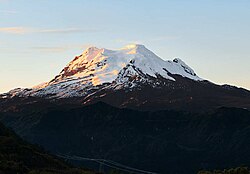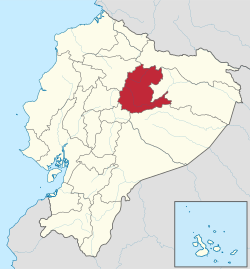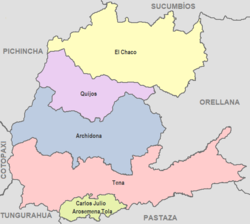Napo (Spanish pronunciation: [ˈnapo]) is a province in Ecuador. Its capital is Tena. The province contains the Napo River. The province is low developed without much industrial presence. The thick rainforest is home to many natives that remain isolated by preference, descendants of those who fled the Spanish invasion in the Andes, and the Incas years before. In 2000, the province was the sole remaining majority-indigenous province of Ecuador, with 56.3% of the province either claiming indigenous identity or speaking an indigenous language.[3]
Napo | |
|---|---|
Province | |
| Province of Napo Provincia de Napo (Spanish) | |
 | |
 Location of Napo Province in Ecuador. | |
 Cantons of Napo Province | |
| Coordinates: 0°59′20″S 77°48′57″W / 0.9890°S 77.8159°W | |
| Country | Ecuador |
| Established | October 22, 1959. |
| Capital | Tena |
| Cantons | List of Cantons |
| Government | |
| • Provincial Prefect | José Toapanta |
| Area | |
• Province | 12,513 km2 (4,831 sq mi) |
| Population (2022 census)[1] | |
• Province | 131,675 |
| • Density | 11/km2 (27/sq mi) |
| • Urban | 44,675 |
| Time zone | UTC-5 (ECT) |
| Vehicle registration | N |
| HDI (2017) | 0.731[2] high · 11th |
| Website | www |
This province is one of the many located in Ecuador's section of the Amazon Rainforest.
In Napo province are also Antisana Ecological Reserve, Sumaco Napo-Galeras National Park, and Limoncocha National Biological Reserve.
Demographics
editEthnic groups as of the Ecuadorian census of 2010:[4]
- Indigenous 56.8%
- Mestizo 38.1%
- White 2.7%
- Afro-Ecuadorian 1.6%
- Montubio 0.6%
- Other 0.2%
Cantons
editThe province is divided into five cantons. The following table lists each with its population at the 2001 census, its area in square kilometres (km2), and the name of the canton seat or capital.[5]
| Canton | Pop. (2001) | Area (km2) | Seat/Capital |
|---|---|---|---|
| Archidona | 18,551 | 3,029 | Archidona |
| Carlos Julio Arosemena Tola | 2,943 | 501 | Carlos Julio Arosemena Tola |
| El Chaco | 6,133 | 3,473 | El Chaco |
| Quijos | 5,505 | 1,577 | Baeza |
| Tena | 46,007 | 3,904 | Tena |
See also
edit- Apostolic Vicariate of Napo, the coinciding Roman Catholic missionary circonscription
- Provinces of Ecuador
- Cantons of Ecuador
- A'i (Cofan) people
References
edit- ^ Citypopulation.de Population and area of Napo Province
- ^ Villalba, Juan. "Human Development Index in Ecuador". Scribd (in Spanish). Retrieved 2019-02-05.
- ^ "Informe Social 2003. Retrieved July 30, 2011" (PDF). Archived from the original (PDF) on December 10, 2011. Retrieved July 30, 2011.
- ^ "Resultados" (PDF).
- ^ Cantons of Ecuador. Statoids.com. Retrieved 4 November 2009.
Further reading
edit- Juncosa, Jose E. (ed.) (1997). Viajes por el Napo: cartas de un misionero (1924-1930). Quito: Abya-Yala. ISBN 9978042601
